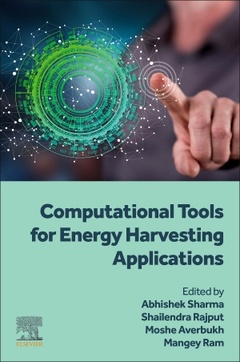Computational Tools for Energy Harvesting Applications
Coordonnateurs : Sharma Abhishek, Rajput Shailendra, Averbukh Moshe, Ram Mangey

Computational Tools for Energy Harvesting Applications presents the latest applications of energy harvesting methods for renewable energy systems. The book provides readers with the computational tools and algorithms for energy harvesting, explaining the mathematical basis behind their development and application and analyzing the latest developments. Each chapter provides a review of the fundamentals and basic theory behind each energy harvester, the working principles, and the latest practical applications. The mathematical techniques and computational tools are provided for response analysis and optimization of diverse energy harvesters, including from fixed renewable energy systems ? wind, solar, etc. ? and portable devices such as PEM fuel cells. This is a valuable reference for students and researchers working in the field of renewable energy harvesting and its application, as well as electrical and mechanical engineers.
1. An Overview of computational algorithms and energy harvesting systems 2. Optimization and computational modeling of piezoelectric transducers 3. Parameter optimization techniques for proton exchange membrane fuel cell 4. Parametric modeling of electromagnetic energy harvester 5. Title: Engineering Applications of Swarm Intelligence 6. Applications of swarm Intelligence and machine learning algorithms in energy harvesting system 7. Role of mathematical modelling in Energy Harvesters 8. Study on solar energy systems during partial shading conditions 9. Prediction of global solar radiation using a single empirical model for diversified locations
Dr. Shailendra Rajput is an Associate Professor at Department of Physics, University Centre for Research & Development, Chandigarh University, Mohali, India. He was a postdoctoral fellow at Ariel University, Israel (September 2017-April 2021) and Xi'an Jiaotong University, China (May 2015-July 2017). His main research work is associated with Energy harvesting, Solar energy, Energy storage, Ferroelectricity, Piezoelectricity, and biomedical application of electromagnetic waves.
Moshe Averbukh (Member, IEEE) received the Ph.D. degree from the Mining Institute A. A. Skochinsky of Academy of Science (Former USSR). He is currently a Senior Lecturer with the Department of Electrical and Electronic Engineering, Ariel University, Israel. He is also the Head of the Electrical Storage Systems and Appliances Laboratory. He has published more than 50 papers in reputed journals and conferences proceedings. He has been serving as a reviewer for several respected journals. He is a guest editor in special issues.
Prof. Mangey Ram received the Ph.D. degree major in Mathematics and minor in Computer Science from G. B. Pant University of Agriculture and Technology, Pantnagar, India. He has been a Faculty Member for around fourteen years and has taught several core courses in pure and applied mathematics at undergraduate, postgraduate, and doctorate levels. He is currently the Research Professor at Graphic Era (Deemed to be University), Dehradun, India & Visiting Professor at Peter the Great St. Petersburg Polytechnic University, Saint Petersburg, Russia. Before joining the Graphic Era, he was a Deputy Manager (Probationary Officer) with Syndicate Bank for a short period.
- Provides analytical tools and computational algorithms, including hybrid and machine learning algorithms, for designing energy harvesters
- Examines and critically compares energy harvesting systems, analyzes their design, and identifies methods for optimization
- Analyzes energy harvester types by their application and the computational tools and algorithms they use
Date de parution : 11-2024
Ouvrage de 340 p.
15x22.8 cm
Thèmes de Computational Tools for Energy Harvesting Applications :
Mots-clés :
Piezoelectric; Optimization; Batteries; Sensors; Power demand; Control algorithm; Fuel cell; Numerical models; Computational modeling; Mathematical modeling; Power engineering computing; Mechanical devices; Deep learning; Artificial intelligence; Optimized harvester; Piezo-magnetoelastic; Classical and metaheuristic algorithms



